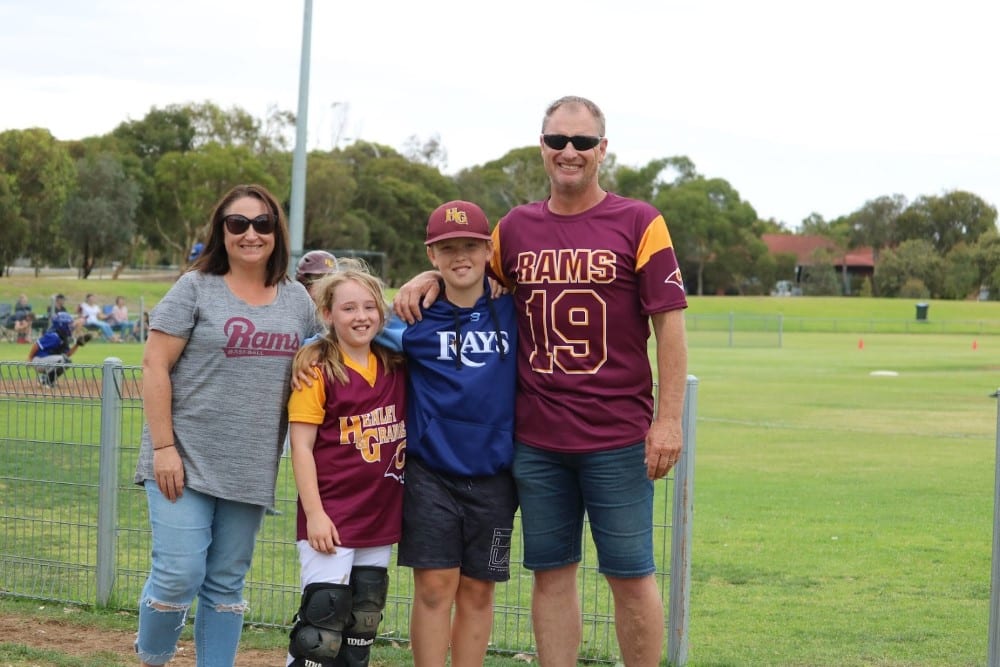
Meet Evie, nine-year-old autism advocate
Nine-year-old Evie is breaking down barriers by telling her classmates what it’s like to live with autism. With the help of the right support services via Feros Care and the NDIS, Evie shares how she doesn’t let her lifelong condition get in the way of hanging out with her friends, playing her favourite sport and enjoying life to the full.
Evie is a Year 4 schoolgirl from Adelaide and, just like her classmates, she enjoys sport – especially baseball – time with her friends, and being with her family.
She loves swimming, playing on the trampoline, painting, and computer games. Evie is a yellow belt in her chosen martial arts, Ninjutsu, and she is devoted to her pets: dogs Jack and Bella, Bailey the cat and Peppa the guinea pig.
But there’s something else nine-year-old Evie would like you to know about her – she has autism, also known as autism spectrum disorder (ASD). She finds loud noises – this can include the cheering at her baseball games – overwhelming. But this doesn’t mean Evie isn’t enjoying herself.
And, she isn’t ‘ashamed’ of her autism. In fact, her mum Sarah, says Evie views autism as her “superhero cape”.
“She sees it that she’s lucky to have autism. She thinks, ‘Yeah, I’m different, this is who I am, and it’s okay.”
Earlier this year, as part of a weekly ‘topic sharing’ exercise at school, Evie decided to talk to her class about autism – a condition that affects one in every 70 people in Australia. With her occupational therapist (OT), Amelia, Evie made a video designed to explain to her fellow students more about the condition which typically affects how a person thinks, feels, interacts with other people, and relates to the environment around them.
“Evie was really proud of the video,” Sarah says. “And, she said lots of kids came up to her afterwards to talk about it. I also had parents message me afterwards saying they didn’t know she had autism.
“In the video she talks about how sometimes she might cover her ears, or she doesn’t participate in something because of her hypersensitivity to sound – she was keen to get that across to people.
“It’s not that she doesn’t want to join in, it’s that she finds it difficult.
“She was having some friendship issues and she wanted her friends to understand that it’s nothing personal, but that she gets overwhelmed and struggles with ‘loudness’.”
It can be more difficult for Evie to join in a sport or social situation, Sarah says, than it would be for another child.
“She’s told her baseball team, ‘I have autism.’ We never use it as an excuse, but sometimes if they’re cheering, she wants them to know that that’s why she might not stand right next to them.
“She’s good at telling people, ‘This is what I need.’ She’s got no shame attached to her autism.”
Sarah says Evie’s teacher also found the video informative and helpful, and shared it with other staff members, with Evie’s consent.
This poignant example of how beneficial it is to empower people from a young age to become their own self-advocates and break down any stigmas was significant and “educational” for Evie’s school community, Sarah says.
“People were surprised because Evie never misbehaves in class and it showed that autism is different for everybody so it was a good opportunity to learn.”
Sarah says that now, with the right supports and services in place, Evie has come a long way.
“She’s such a happy and beautiful child. She’s learnt new tools and she has built this resilience and confidence.”
When she was younger, Evie encountered, endured, and endeavoured to overcome a range of challenges. At times, she found it difficult to manage her emotions and could struggle to recognise facial cues or body language.
Sarah says that trying to support Evie’s needs, along with those of the rest of the family, was demanding.
“Now, though, our household has had a significant shift because we’ve all got a better understanding of Evie’s autism and because we’ve got the right support.
“We’re all learning from the OT and speech therapist as well. Her NDIS funding has made a huge improvement in our house and has meant a significant change for our whole family.”
Through Feros Care and the NDIS, Evie receives supports including fortnightly OT sessions, fortnightly speech therapy and consults with a psychologist.
Sarah says that the provision of the supports now in place for Evie has improved her relationships and communication with others, including at school, socially and in her involvement with team sports.
The OT sessions have helped her recognise and take part in completing chores around the house such as making her bed, packing her school bag, feeding the guinea pigs, and unloading the dish washer.
These developments are a “huge” improvement, Sarah says, and she’s “thrilled” with Evie’s progress.
Sarah says Evie also now loves to make her mum a pod coffee every morning … and, just to top it off, she’s more than happy to be the first one to offer a hug.